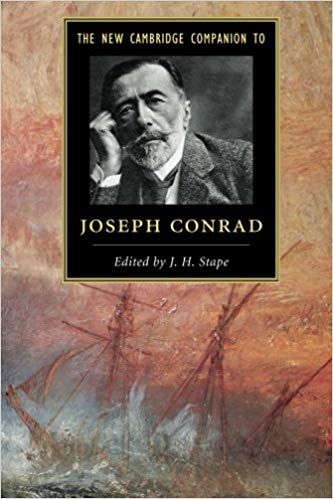tutorial, commentary, study resources, plot, and web links
To-Morrow was written in early 1902 and serialized in Pall Mall Magazine, 1902. It was later collected in Typhoon and Other Stories (1903). The other stories in the volume were Amy Foster, Falk: A Reminiscence, and Typhoon. In currently available editions, these are supplemented by the novella The Secret Sharer.
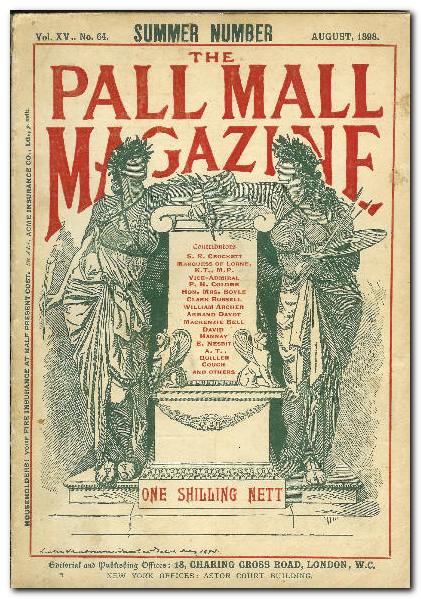
To-Morrow – critical commentary
This is a story of deluded hopes and dramatic irony which might have come from the pages of Thomas Hardy rather than his friend and contemporary Joseph Conrad.
There are two principal ironies in the tale – one real, and the other potential. The first, which is real, is that the apparently doting father Hagberd turns out to be a tyrant and a fraud, whose eagerly awaited son actually wants nothing to do with him. Hagberd has built up a self-enclosed system of belief about his son, and he has prepared a homecoming which is a myth which sustains Hagberd himself.
The second irony, which may only be realised outside the narrative time-frame, is that Harry borrows money from the hapless and moon-struck Bessie, but if Hagberd sticks to his word and disinherits his son, she will be the benefactor.
Even Conrad, in his introductory remarks to the collection Typhoon and Other Stories, has very little to say about the tale:
Of that story I will only say that It struck many people by its adaptability to the stage, and that I was induced to dramatise it under the title of One Day More, up to the present my only effort in that direction. (1919)
To-Morrow – study resources
![]() Typhoon and Other Stories – Oxford World Classics – Amazon UK
Typhoon and Other Stories – Oxford World Classics – Amazon UK
![]() Typhoon and Other Stories – Oxford World Classics – Amazon US
Typhoon and Other Stories – Oxford World Classics – Amazon US
![]() To-Morrow – Kindle eBook
To-Morrow – Kindle eBook
![]() One Day More – Kindle eBook
One Day More – Kindle eBook
![]() Typhoon and Other Stories – eBook at Project Gutenberg
Typhoon and Other Stories – eBook at Project Gutenberg
![]() Joseph Conrad: A Biography – Amazon UK
Joseph Conrad: A Biography – Amazon UK
![]() The Cambridge Companion to Joseph Conrad – Amazon UK
The Cambridge Companion to Joseph Conrad – Amazon UK
![]() Routledge Guide to Joseph Conrad – Amazon UK
Routledge Guide to Joseph Conrad – Amazon UK
![]() Oxford Reader’s Companion to Conrad – Amazon UK
Oxford Reader’s Companion to Conrad – Amazon UK
![]() Notes on Life and Letters – Amazon UK
Notes on Life and Letters – Amazon UK
![]() Joseph Conrad – biographical notes
Joseph Conrad – biographical notes
To-Morrow – plot summary
Retired skipper Hagberd goes from Colchester to Coalbrook in search of his son Harry, who ran away to sea. Failing to find him, Hagberd settles there. He confides his hopes for his son’s return (which he endlessly hopes will be ‘to-morrow’) to Bessie, the daughter of his next door neighbour and tenant.
Hagberd has been a reluctant sailor, rarely out of sight of land. He makes elaborate preparations for Harry`s return, and assumes he will be a suitable husband for Bessie. She looks after her cantankerous father, who mistreats her.
Hagberd advertises in the newspapers for information about his son, and meanwhile furnishes the cottage for his arrival, letting nobody see the results.
One day a man arrives at the cottage claiming to have news of Hagberd’s son – but the old skipper refuses to hear it, claiming that he has all the information he needs, as his son will be returning soon. The man turns out to be his son Harry, and Bessie explains how he has kept up his hopes with the myth of `to-morrow’.
Harry tells Bessie how his father mistreated him as a child. Harry tries to get inside Hagberd’s cottage, but his father will not let anybody in. He goes into Bessie’s cottage instead and recounts scenes from his childhood, including satirical accounts of his father boasting about going on long sea voyages, when it was just short trips up the coast to South Shields for coal.
Harry reveals himself as a sailor adventurer who has been on a drinking spree in London and come to his father’s house in the hope of borrowing some money He tells Bessie romantic tales of prospecting for gold in Mexico and mixing with Gambucinos who live independent carefree lives.
Bessie tells him of Hagberd’s plans and preparations for his son – but Harry rejects them scornfully. He does not want to be pinned down to domestic life. Hagberd meanwhile shouts down from upstairs next door, warning Bessie not to deal with the stranger, but to wait for Harry who will be there the next day. He threatens that if Harry does not marry her when he turns up, he will cut him out of his will and leave Bessie all his money.
This alerts Harry to the full extent of his father’s plans. He borrows money from Bessie, showers her with kisses, and leaves.
To-Morrow – principal characters
| Captain Hagberd | a retired coastal skipper and widower |
| Harry Hagberd | his son, an adventurer (31) |
| Josiah Carvil | a blind boat-builder, his neighbour |
| Bessie Carvil | his daughter |
Biography
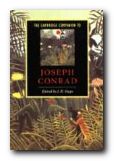 The Cambridge Companion to Joseph Conrad offers a series of essays by leading Conrad scholars aimed at both students and the general reader. There’s a chronology and overview of Conrad’s life, then chapters that explore significant issues in his major writings, and deal in depth with individual works. These are followed by discussions of the special nature of Conrad’s narrative techniques, his complex relationships with late-Victorian imperialism and with literary Modernism, and his influence on other writers and artists. Each essay provides guidance to further reading, and a concluding chapter surveys the body of Conrad criticism.
The Cambridge Companion to Joseph Conrad offers a series of essays by leading Conrad scholars aimed at both students and the general reader. There’s a chronology and overview of Conrad’s life, then chapters that explore significant issues in his major writings, and deal in depth with individual works. These are followed by discussions of the special nature of Conrad’s narrative techniques, his complex relationships with late-Victorian imperialism and with literary Modernism, and his influence on other writers and artists. Each essay provides guidance to further reading, and a concluding chapter surveys the body of Conrad criticism.
![]() Buy the book at Amazon UK
Buy the book at Amazon UK
![]() Buy the book at Amazon US
Buy the book at Amazon US
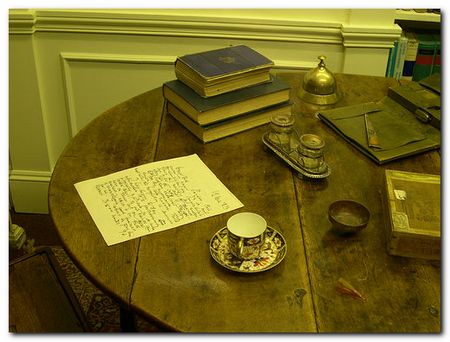
Joseph Conrad’s writing table
Further reading
![]() Amar Acheraiou Joseph Conrad and the Reader, London: Macmillan, 2009.
Amar Acheraiou Joseph Conrad and the Reader, London: Macmillan, 2009.
![]() Jacques Berthoud, Joseph Conrad: The Major Phase, Cambridge: Cambridge University Press, 1978.
Jacques Berthoud, Joseph Conrad: The Major Phase, Cambridge: Cambridge University Press, 1978.
![]() Muriel Bradbrook, Joseph Conrad: Poland’s English Genius, Cambridge: Cambridge University Press, 1941
Muriel Bradbrook, Joseph Conrad: Poland’s English Genius, Cambridge: Cambridge University Press, 1941
![]() Harold Bloom (ed), Joseph Conrad (Bloom’s Modern Critical Views, New Yoprk: Chelsea House Publishers, 2010
Harold Bloom (ed), Joseph Conrad (Bloom’s Modern Critical Views, New Yoprk: Chelsea House Publishers, 2010
![]() Hillel M. Daleski , Joseph Conrad: The Way of Dispossession, London: Faber, 1977
Hillel M. Daleski , Joseph Conrad: The Way of Dispossession, London: Faber, 1977
![]() Daphna Erdinast-Vulcan, Joseph Conrad and the Modern Temper, Oxford: Oxford University Press, 1991.
Daphna Erdinast-Vulcan, Joseph Conrad and the Modern Temper, Oxford: Oxford University Press, 1991.
![]() Aaron Fogel, Coercion to Speak: Conrad’s Poetics of Dialogue, Cambridge, Mass: Harvard University Press, 1985
Aaron Fogel, Coercion to Speak: Conrad’s Poetics of Dialogue, Cambridge, Mass: Harvard University Press, 1985
![]() John Dozier Gordon, Joseph Conrad: The Making of a Novelist, Cambridge, Mass: Harvard University Press, 1940
John Dozier Gordon, Joseph Conrad: The Making of a Novelist, Cambridge, Mass: Harvard University Press, 1940
![]() Albert J. Guerard, Conrad the Novelist, Cambridge, Mass: Harvard University Press, 1958
Albert J. Guerard, Conrad the Novelist, Cambridge, Mass: Harvard University Press, 1958
![]() Robert Hampson, Joseph Conrad: Betrayal and Identity, Basingstoke: Macmillan, 1992
Robert Hampson, Joseph Conrad: Betrayal and Identity, Basingstoke: Macmillan, 1992
![]() Jeremy Hawthorn, Joseph Conrad: Language and Fictional Self-Consciousness, London: Edward Arnold, 1979
Jeremy Hawthorn, Joseph Conrad: Language and Fictional Self-Consciousness, London: Edward Arnold, 1979
![]() Jeremy Hawthorn, Joseph Conrad: Narrative Technique and Ideological Commitment, London: Edward Arnold, 1990
Jeremy Hawthorn, Joseph Conrad: Narrative Technique and Ideological Commitment, London: Edward Arnold, 1990
![]() Jeremy Hawthorn, Sexuality and the Erotic in the Fiction of Joseph Conrad, London: Continuum, 2007.
Jeremy Hawthorn, Sexuality and the Erotic in the Fiction of Joseph Conrad, London: Continuum, 2007.
![]() Owen Knowles, The Oxford Reader’s Companion to Conrad, Oxford: Oxford University Press, 1990
Owen Knowles, The Oxford Reader’s Companion to Conrad, Oxford: Oxford University Press, 1990
![]() Jakob Lothe, Joseph Conrad: Voice, Sequence, History, Genre, Ohio State University Press, 2008
Jakob Lothe, Joseph Conrad: Voice, Sequence, History, Genre, Ohio State University Press, 2008
![]() Gustav Morf, The Polish Shades and Ghosts of Joseph Conrad, New York: Astra, 1976
Gustav Morf, The Polish Shades and Ghosts of Joseph Conrad, New York: Astra, 1976
![]() Ross Murfin, Conrad Revisited: Essays for the Eighties, Tuscaloosa, Ala: University of Alabama Press, 1985
Ross Murfin, Conrad Revisited: Essays for the Eighties, Tuscaloosa, Ala: University of Alabama Press, 1985
![]() Jeffery Myers, Joseph Conrad: A Biography, Cooper Square Publishers, 2001.
Jeffery Myers, Joseph Conrad: A Biography, Cooper Square Publishers, 2001.
![]() Zdzislaw Najder, Joseph Conrad: A Life, Camden House, 2007.
Zdzislaw Najder, Joseph Conrad: A Life, Camden House, 2007.
![]() George A. Panichas, Joseph Conrad: His Moral Vision, Mercer University Press, 2005.
George A. Panichas, Joseph Conrad: His Moral Vision, Mercer University Press, 2005.
![]() John G. Peters, The Cambridge Introduction to Joseph Conrad, Cambridge: Cambridge University Press, 2006.
John G. Peters, The Cambridge Introduction to Joseph Conrad, Cambridge: Cambridge University Press, 2006.
![]() James Phelan, Joseph Conrad: Voice, Sequence, History, Genre, Ohio State University Press, 2008.
James Phelan, Joseph Conrad: Voice, Sequence, History, Genre, Ohio State University Press, 2008.
![]() Edward Said, Joseph Conrad and the Fiction of Autobiography, Cambridge Mass: Harvard University Press, 1966
Edward Said, Joseph Conrad and the Fiction of Autobiography, Cambridge Mass: Harvard University Press, 1966
![]() Allan H. Simmons, Joseph Conrad: (Critical Issues), London: Macmillan, 2006.
Allan H. Simmons, Joseph Conrad: (Critical Issues), London: Macmillan, 2006.
![]() J.H. Stape, The Cambridge Companion to Joseph Conrad, Cambridge: Cambridge University Press, 1996
J.H. Stape, The Cambridge Companion to Joseph Conrad, Cambridge: Cambridge University Press, 1996
![]() John Stape, The Several Lives of Joseph Conrad, Arrow Books, 2008.
John Stape, The Several Lives of Joseph Conrad, Arrow Books, 2008.
![]() Peter Villiers, Joseph Conrad: Master Mariner, Seafarer Books, 2006.
Peter Villiers, Joseph Conrad: Master Mariner, Seafarer Books, 2006.
![]() Ian Watt, Conrad in the Nineteenth Century, London: Chatto and Windus, 1980
Ian Watt, Conrad in the Nineteenth Century, London: Chatto and Windus, 1980
![]() Cedric Watts, Joseph Conrad: (Writers and their Work), London: Northcote House, 1994.
Cedric Watts, Joseph Conrad: (Writers and their Work), London: Northcote House, 1994.
Other work by Joseph Conrad
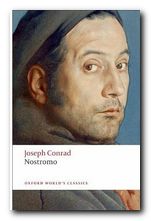 Nostromo (1904) is Conrad’s ‘big’ political novel – into which he packs all of his major subjects and themes. It is set in the imaginary Latin-American country of Costaguana – and features a stolen hoard of silver, desperate acts of courage, characters trembling on the brink of moral panic. The political background encompasses nationalist revolution and the Imperialism of foreign intervention. Silver is the pivot of the whole story – revealing the courage of some and the corruption and destruction of others. Conrad’s narration is as usual complex and oblique. He begins half way through the events of the revolution, and proceeds by way of flashbacks and glimpses into the future.
Nostromo (1904) is Conrad’s ‘big’ political novel – into which he packs all of his major subjects and themes. It is set in the imaginary Latin-American country of Costaguana – and features a stolen hoard of silver, desperate acts of courage, characters trembling on the brink of moral panic. The political background encompasses nationalist revolution and the Imperialism of foreign intervention. Silver is the pivot of the whole story – revealing the courage of some and the corruption and destruction of others. Conrad’s narration is as usual complex and oblique. He begins half way through the events of the revolution, and proceeds by way of flashbacks and glimpses into the future.
![]() Buy the book from Amazon UK
Buy the book from Amazon UK
![]() Buy the book from Amazon US
Buy the book from Amazon US
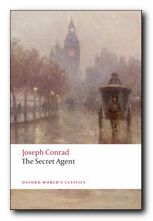 The Secret Agent (1907) is a short novel and a masterpiece of sustained irony. It is based on the real incident of a bomb attack on the Greenwich Observatory in 1888 and features a cast of wonderfully grotesque characters: Verloc the lazy double agent, Inspector Heat of Scotland Yard, and the Professor – an anarchist who wanders through the novel with bombs strapped round his waist and the detonator in his hand. The English government and police are subject to sustained criticism, and the novel bristles with some wonderfully orchestrated effects of dramatic irony – all set in the murky atmosphere of Victorian London. Here Conrad prefigures all the ambiguities which surround two-faced international relations, duplicitous State realpolitik, and terrorist outrage which still beset us more than a hundred years later.
The Secret Agent (1907) is a short novel and a masterpiece of sustained irony. It is based on the real incident of a bomb attack on the Greenwich Observatory in 1888 and features a cast of wonderfully grotesque characters: Verloc the lazy double agent, Inspector Heat of Scotland Yard, and the Professor – an anarchist who wanders through the novel with bombs strapped round his waist and the detonator in his hand. The English government and police are subject to sustained criticism, and the novel bristles with some wonderfully orchestrated effects of dramatic irony – all set in the murky atmosphere of Victorian London. Here Conrad prefigures all the ambiguities which surround two-faced international relations, duplicitous State realpolitik, and terrorist outrage which still beset us more than a hundred years later.
![]() Buy the book from Amazon UK
Buy the book from Amazon UK
![]() Buy the book from Amazon US
Buy the book from Amazon US
© Roy Johnson 2013
Joseph Conrad links
Joseph Conrad at Mantex
Biography, tutorials, book reviews, study guides, videos, web links.
Joseph Conrad – his greatest novels and novellas
Brief notes introducing his major works in recommended editions.
Joseph Conrad at Project Gutenberg
A major collection of free eTexts in a variety of formats.
Joseph Conrad at Wikipedia
Biography, major works, literary career, style, politics, and further reading.
Joseph Conrad at the Internet Movie Database
Adaptations for the cinema and television – in various languages. Full details of directors and actors, production notes, box office, trivia, and quizzes.
Works by Joseph Conrad
Large online database of free HTML texts, digital scans, and eText versions of novels, stories, and occasional writings.
The Joseph Conrad Society (UK)
Conradian journal, reviews. and scholarly resources.
The Joseph Conrad Society of America
American-based – recent publications, journal, awards, conferences.
Hyper-Concordance of Conrad’s works
Locate a word or phrase – in the context of the novel or story.
More on Joseph Conrad
Twentieth century literature
Joseph Conrad complete tales
